新概念英语第一册91课单词
- 格式:ppt
- 大小:432.50 KB
- 文档页数:6

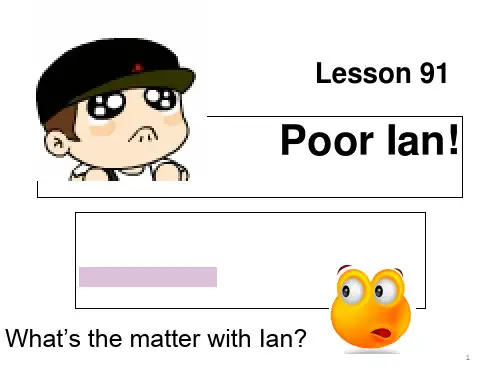
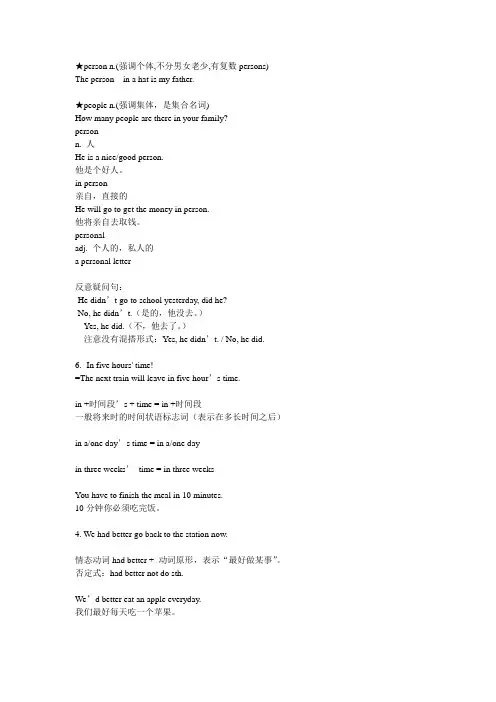
★person n.(强调个体,不分男女老少,有复数persons) The person in a hat is my father.★people n.(强调集体,是集合名词)How many people are there in your family?personn. 人He is a nice/good person.他是个好人。
in person亲自,直接的He will go to get the money in person.他将亲自去取钱。
personaladj. 个人的,私人的a personal letter反意疑问句:-He didn’t go to school yesterday, did he?-No, he didn’t.(是的,他没去。
)Yes, he did.(不,他去了。
)注意没有混搭形式:Yes, he didn’t. / No, he did.6. -In five hours' time!=The next train will leave in five hour’s time.in +时间段’s + time = in +时间段一般将来时的时间状语标志词(表示在多长时间之后)in a/one day’s time = in a/one dayin three weeks’time = in three weeksYou have to finish the meal in 10 minutes.10分钟你必须吃完饭。
4. We had better go back to the station now.情态动词had better + 动词原形,表示“最好做某事”。
否定式:had better not do sth.We’d better eat an apple everyday.我们最好每天吃一个苹果。
Let's go and have a drink.Let’s go and do sth.让我们去做某事。
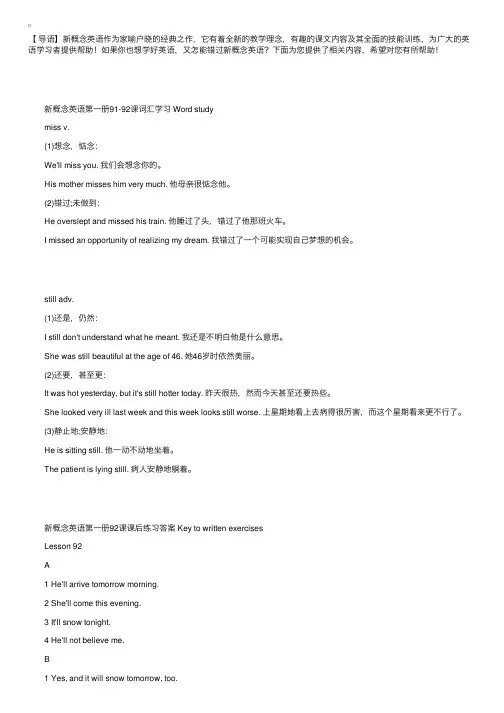
【导语】新概念英语作为家喻户晓的经典之作,它有着全新的教学理念,有趣的课⽂内容及其全⾯的技能训练,为⼴⼤的英语学习者提供帮助!如果你也想学好英语,⼜怎能错过新概念英语?下⾯为您提供了相关内容,希望对您有所帮助! 新概念英语第⼀册91-92课词汇学习 Word study miss v. (1)想念,惦念: We'll miss you. 我们会想念你的。
His mother misses him very much. 他母亲很惦念他。
(2)错过;未做到: He overslept and missed his train. 他睡过了头,错过了他那班⽕车。
I missed an opportunity of realizing my dream. 我错过了⼀个可能实现⾃⼰梦想的机会。
still adv. (1)还是,仍然: I still don't understand what he meant. 我还是不明⽩他是什么意思。
She was still beautiful at the age of 46. 她46岁时依然美丽。
(2)还要,甚⾄更: It was hot yesterday, but it's still hotter today. 昨天很热,然⽽今天甚⾄还要热些。
She looked very ill last week and this week looks still worse. 上星期她看上去病得很厉害,⽽这个星期看来更不⾏了。
(3)静⽌地;安静地: He is sitting still. 他⼀动不动地坐着。
The patient is lying still. 病⼈安静地躺着。
新概念英语第⼀册92课课后练习答案 Key to written exercises Lesson 92 A 1 He'll arrive tomorrow morning. 2 She'll come this evening. 3 It'll snow tonight. 4 He'll not believe me. B 1 Yes, and it will snow tomorrow, too. 2 Yes, and he will get up late tomorrow, too. 3 Yes, and he will arrive late tomorrow, too. 4 Yes, and he will finish work late tomorrow, too. 5 Yes, and she will drive to London tomorrow, too. 6 Yes, and she will telephone him tomorrow, too. 7 Yes, and he will have a shave tomorrow, too. 8 Yes, and she will sweep the floor tomorrow, too.。
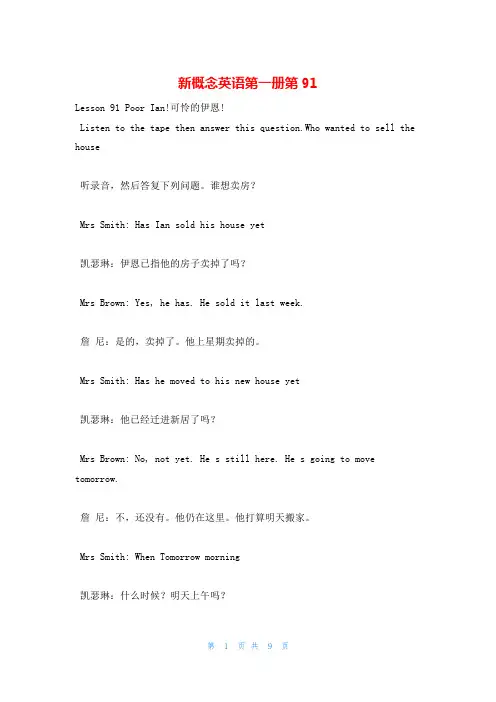
新概念英语第一册第91Lesson 91 Poor Ian!可怜的伊恩!Listen to the tape then answer this question.Who wanted to sell the house听录音,然后答复下列问题。
谁想卖房?Mrs Smith: Has Ian sold his house yet凯瑟琳:伊恩已指他的房子卖掉了吗?Mrs Brown: Yes, he has. He sold it last week.詹尼:是的,卖掉了。
他上星期卖掉的。
Mrs Smith: Has he moved to his new house yet凯瑟琳:他已经迁进新居了吗?Mrs Brown: No, not yet. He s still here. He s going to move tomorrow.詹尼:不,还没有。
他仍在这里。
他打算明天搬家。
Mrs Smith: When Tomorrow morning凯瑟琳:什么时候?明天上午吗?Mrs Brown: No. Tomorrow afternoon. I ll miss him. He has always been a good neighbour.詹尼:不,明天下午。
我会想念他的。
他一直是个好邻居。
Mrs Green: He s a very nice person. We shall all miss him.琳达:他是个非常好的人,我们大学都会想念他的。
Mrs Smith; When will the new people move into this house凯瑟琳:新住户什么时候搬进这所房子?Mrs Brown: I think that they will move in the day after tomorrow.詹尼:我想他们将会在后天搬进来吧。
Mrs Green: Will you see Lan today, Mrs Brown琳达:詹尼,您今天会见到伊恩吗?Mrs Brown: Yes, I will.詹尼:是的,我会见到他。

Lesson 91 Poor Ian!可怜的伊恩!Listen to the tape then answer this question.Who wanted to sell the house?听录音,然后回答问题。
谁想卖房?Mrs Smith: Has Ian sold his house yet?凯瑟琳:伊恩已指他的房子卖掉了吗?Mrs Brown: Yes, he has. He sold it last week.詹尼:是的,卖掉了。
他上星期卖掉的。
Mrs Smith: Has he moved to his new house yet?凯瑟琳:他已经迁进新居了吗?Mrs Brown: No, not yet. He’s still here. He’s going to move tomorrow.詹尼:不,还没有。
他仍在这里。
他打算明天搬家。
Mrs Smith: When? Tomorrow morning?凯瑟琳:什么时候?明天上午吗?Mrs Brown: No. Tomorrow afternoon. I’ll miss him. He has always been a good neighbour.詹尼:不,明天下午。
我会想念他的。
他一直是个好邻居。
Mrs Green: He’s a very nice person. We shall all miss him.琳达:他是个非常好的人,我们大学都会想念他的。
Mrs Smith; When will the new people move into this house?凯瑟琳:新住户什么时候搬进这所房子?Mrs Brown: I think that they will move in the day after tomorrow. 詹尼:我想他们将会在后天搬进来吧。
Mrs Green: Will you see Lan today, Mrs Brown?琳达:詹尼,您今天会见到伊恩吗?Mrs Brown: Yes, I will.詹尼:是的,我会见到他。
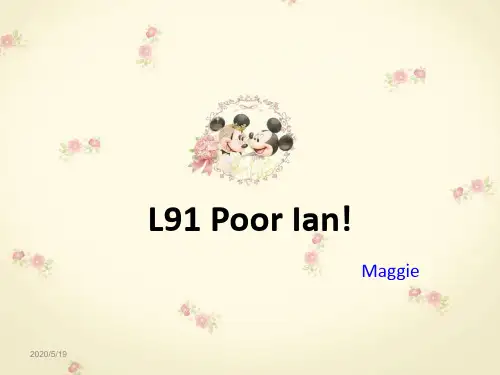
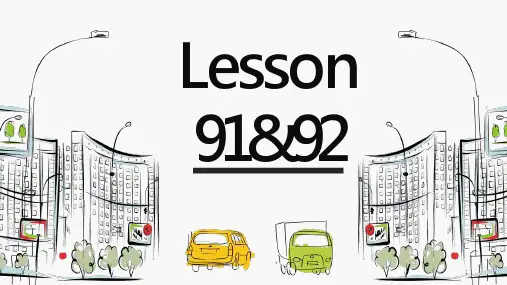
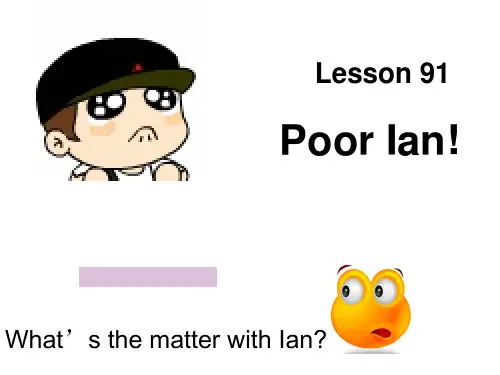
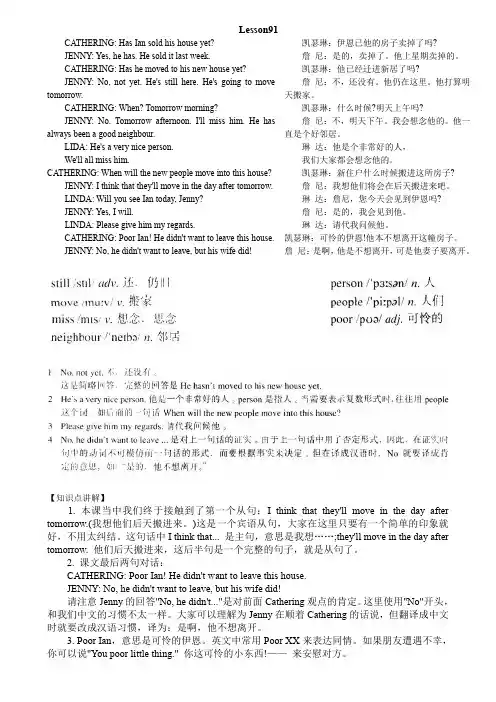
【知识点讲解】1. 本课当中我们终于接触到了第一个从句:I think that they'll move in the day after tomorrow.(我想他们后天搬进来。
)这是一个宾语从句,大家在这里只要有一个简单的印象就好,不用太纠结。
这句话中I think that... 是主句,意思是我想……;they'll move in the day after tomorrow. 他们后天搬进来,这后半句是一个完整的句子,就是从句了。
2. 课文最后两句对话:CATHERING: Poor Ian! He didn't want to leave this house. JENNY: No, he didn't want to leave, but his wife did!请注意Jenny 的回答"No, he didn't..."是对前面Cathering 观点的肯定。
这里使用"No"开头,和我们中文的习惯不太一样。
大家可以理解为Jenny 在顺着Cathering 的话说,但翻译成中文时就要改成汉语习惯,译为:是啊,他不想离开。
3. Poor Ian ,意思是可怜的伊恩。
英文中常用Poor XX 来表达同情。
如果朋友遭遇不幸,你可以说"You poor little thing." 你这可怜的小东西!—— 来安慰对方。
Lesson91CA THERING: Has Ian sold his house yet? JENNY: Yes, he has. He sold it last week.CA THERING: Has he moved to his new house yet?JENNY: No, not yet. He's still here. He's going to move tomorrow.CA THERING: When? Tomorrow morning?JENNY: No. Tomorrow afternoon. I'll miss him. He has always been a good neighbour.LIDA: He's a very nice person. We'll all miss him.CATHERING: When will the new people move into this house? JENNY: I think that they'll move in the day after tomorrow. LINDA: Will you see Ian today, Jenny? JENNY: Yes, I will.LINDA: Please give him my regards.CA THERING: Poor Ian! He didn't want to leave this house. JENNY: No, he didn't want to leave, but his wife did! 凯瑟琳:伊恩已他的房子卖掉了吗?詹 尼:是的,卖掉了。
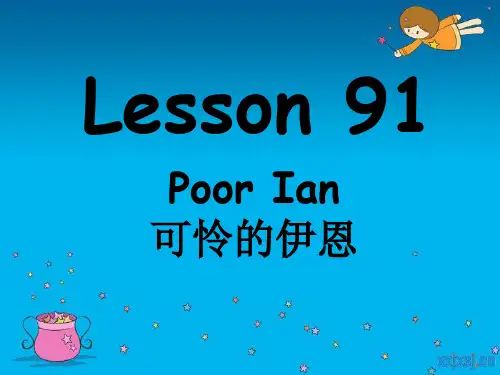
新概念英语第一册第91-92课:Poor LanLesson 91 Poor Ian!可怜的伊恩!Listen to the tape then answer this question.Who wanted to sell the house?听录音,然后回答问题。
谁想卖房?Mrs Smith: Has Ian sold his house yet?凯瑟琳:伊恩已指他的房子卖掉了吗?Mrs Brown: Yes, he has. He sold it last week.詹尼:是的,卖掉了。
他上星期卖掉的。
Mrs Smith: Has he moved to his new house yet?凯瑟琳:他已经迁进新居了吗?Mrs Brown: No, not yet. Hes still here. Hes going to move tomorrow.詹尼:不,还没有。
他仍在这里。
他准备明天搬家。
Mrs Smith: When? Tomorrow morning?凯瑟琳:什么时候?明天上午吗?Mrs Brown: No. Tomorrow afternoon. Ill miss him. He has always been a good neighbour.詹尼:不,明天下午。
我会惦念他的。
他始终是个好邻居。
Mrs Green: Hes a very nice person. We shall all miss him.琳达:他是个特别好的人,我们高校都会惦念他的。
Mrs Smith; When will the new people move into this house?凯瑟琳:新住户什么时候搬进这所房子?Mrs Brown: I think that they will move in the day after tomorrow.詹尼:我想他们将会在后天搬进来吧。
Mrs Green: Will you see Lan today, Mrs Brown?琳达:詹尼,您今日会见到伊恩吗?Mrs Brown: Yes, I will.詹尼:是的,我会见到他。
新概念英语第1册语法及单词Lesson91~96新概念英语第1册语法及单词Lesson91~92语法 Grammar in use一般将来时(1)一般将来时表示将来某一时刻的动作、状态以及准备。
该时态一般与表示将来意义的时间状语连用,如tomorrow(明天),this month(本月), the day after tomorrow(后天),next week (下周), in two days”time(两天之后), from now on(从现在起),in the future(将来)等。
(2)一般将来时的形式为 will/shall+ 动词原形。
will可用于全部人称,但shall仅表示单纯将来时用于第一人称I 和we,作为will的一种替代形式。
否认缩写: shan”t =shall not, won”t =will not:I shan”t leave tonight. I”ll leave tomorrow.今日夜里我不走。
我将于明天离开。
They won”t go to London this weekend.这个周末他们不去伦敦。
此外,will除了表示纯粹的将来时间外,还表示说话人的意图和意愿,而shall除了表示将来时间外同时还表示说话人的责任或决心。
(3)除了will/shall外,还可以用其他方法表示将来。
在口语中,be going to比 will/shall更为一般,用来表示说话人的意图或准备。
如: She is going to travel by air.她准备乘飞机旅行。
也可用来表示有迹象某事马上发生。
如:It”s going to rain.将要下雨了。
(4)可与将来时连用的时间短语有:今日:this morning / afternoon / evening今日上午/下午/晚上明天:tomorrow morning / afternoon / evening明天上午/下午/晚上后天:the day after tomorrow后天the night after next后天夜里其他:tonight今夜in the morning在上午in the afternoon 在下午in the evening在晚上词汇学习 Word study1.miss v.(1)惦念,惦念:We”ll miss you.我们会惦念你的。
Lesson 91 poor Ian 可怜的伊恩一、单词与短语still:adv.还,仍旧;move:v.搬家;关于move掌握两个短语:move into:搬进、、、例:Tom moved into a new house last week.汤姆上周搬进新家了。
Move out:搬出去;例:When will you move out from the house?你们什么时候从房子里搬出去?miss: v.想念,思念;例:I miss you terribly.我非常想念你。
关于miss还需要掌握它另外的一个意思:错过、、、或者:未赶上、、、、I am afraid that we will miss the train.我担心我们赶不上火车。
neighbour: n.邻居;person:n.人;people:n.人们;poor:adj.可怜的;例:What a poor guy he is.多么可怜的一个家伙。
poor另外的一个意思是:贫穷的;例:the poor:穷人们;the rich:富人们;二、短语、句型及语法1、He has always been a good neighbour.他一直是个好邻居。
①always“总是”的意思,它是一般现在时的显著标志词,一般跟一般现在时连用,但此处always却与现在完成时连用,always与现在完成时连用表示“一向、、、”或者“总是、、、”带有强烈的赞同或厌恶感情色彩,例:I’ve always believed he was wrong.我一直认为他是错的。
He has always been a good neighbour.他一直是个好邻居。
②掌握与always相关的一个常用搭配:be always doing sth: 总是、、、(带有强烈的感情色彩,表示厌恶或赞许)例:He is always making fun of me.他总是捉弄我。